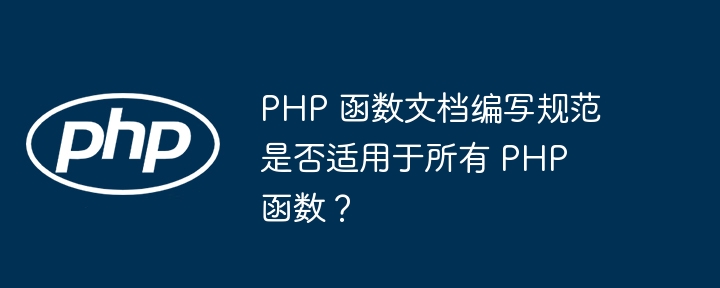Home >Backend Development >PHP Tutorial >Does the PHP function documentation convention apply to all PHP functions?
Does the PHP function documentation convention apply to all PHP functions?
- WBOYWBOYWBOYWBOYWBOYWBOYWBOYWBOYWBOYWBOYWBOYWBOYWBOriginal
- 2024-04-27 11:39:011042browse
PHP function document writing specifications mainly apply to functions in core and pecl extensions, as well as self-built functions, but do not apply to built-in language structures and third-party library functions. These specifications include adding @since tags, providing detailed descriptions, and using data type annotations to improve the clarity and understandability of function documentation and enhance the maintainability and readability of code.

PHP function documentation writing specifications: scope of application and practical cases
PHP function documentation writing specifications are a set of guidelines that aim to Helping developers write clear, consistent, and understandable function documentation. But it should be clear that these specifications do not apply to all PHP functions.
Scope of application
Function document writing specifications are mainly applicable to the following situations:
- Core PHP functions:these Functions are part of the core of the PHP language.
- Functions in the pecl extension: The pecl extension provides additional functionality to PHP and follows the same documentation conventions as core PHP functions.
- Self-built functions: Functions built by developers. Following these specifications can help improve the maintainability and readability of the code.
Non-applicable scope
Function documentation writing specifications do not apply to the following situations:
- Built-in language structures : Such as control flow statements, data structures, etc.
- Third-party library functions: The documentation specifications of functions provided by third-party libraries may be different from the PHP standard specifications.
Practical case
In order to further understand the PHP function document writing specifications, here is a practical case:
Original function document :
/**
* 获取当前时间戳
*
* @return int 当前时间戳
*/
function get_timestamp() {
// 函数逻辑...
}Function documentation that follows the specification:
/**
* 获取当前时间戳
*
* 返回自 Unix 纪元(1970-01-01 00:00:00 UTC)以来经过的秒数。
*
* @return int 当前时间戳
* @since 7.0.0
*/
function get_timestamp(): int {
// 函数逻辑...
}The following information is added to the function documentation that follows the specification:
-
@sinceTag: specifies the available version of the function. - Detailed description: Explain what the function returns and its purpose.
- Data type annotation: Indicate that the return type is an integer (int).
Following these specifications makes function documentation clearer and easier to understand, thereby improving the maintainability and readability of the code.
The above is the detailed content of Does the PHP function documentation convention apply to all PHP functions?. For more information, please follow other related articles on the PHP Chinese website!
Related articles
See more- How to open php file? How to run php file?
- Summary of common PHP interview questions (with answers)
- API common signature verification methods (PHP implementation)
- How to represent the return value of a function in Golang function documentation?
- Why should PHP function documentation follow writing conventions?

